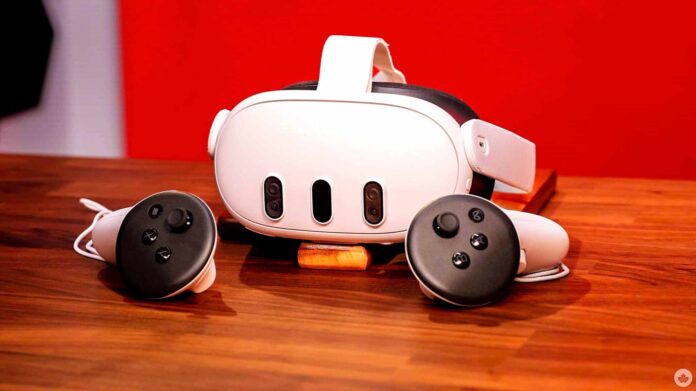Inadvertently, Meta has leaked the upcoming light version of the Meta Quest 3 in its own store. The Meta Quest 3s is likely to replace the affordable Quest 2
A cheaper alternative to the Meta Quest 3 has been rumored for some time. Even before the release of the Meta Quest 3, there were hints of a light model of the mobile VR glasses, which are not overly expensive at 550 euros, but not cheap either.
Now Meta itself seems to have leaked the existence and the specific name of this VR hardware via its own store.
On the store page of the appAlo Moves XRin addition to Meta Quest 2, Meta Quest 3 and Meta Quest Pro, a Meta Quest 3s was also listed among the supported headsets.
But only briefly, the corresponding entry has since been corrected, the reference to the Quest 3s is now missing again. During our research, we could no longer find a game in which the Quest 3s is still mentioned.
What’s in the Meta Quest 3s and why should I look forward to it?
A few days ago, details about a slimmed-down Meta Quest 3 were already making the rounds VR enthusiast Luna shared a slide from an internal Meta presentation via X/Twitter, on which the Quest 3s (codenames: Ventura and Panther) could be seen and examined with technical data
Exclusive: Meta Quest 3s (preliminary naming)
Project Codenames: Ventura, Panther
I have seen multiple devkits and spoken to several people familiar with the device. Here are all the things I have learned and feel comfortable sharing in a single infographic: pic.twitter.com/OFFURqVODS
– Luna (@Lunayian) May 20, 2024
Technical data of the Meta Quest 3s:
- Qualcomm Snapdragon XR2 Gen 2
- LCD with 1,832 x 1,920 pixels per eye
- 90/120 Hz refresh rate
- Fresnel lenses with IPD adjustment in three stages
- 4 IR tracking cameras
- 2 Camera for color passthrough
- 2 IR illuminators for depth information
Why is this interesting?Meta seems to be selling off the Meta Quest 2, the VR glasses have undergone several price reductions in recent months to now only 250 euros (128 GB). The first retailers already seem to have run out of stock. A successor is therefore apparently already in the pipeline
The price of the Meta Quest 3s is likely to be based on that of the Meta Quest 2 and will be closer to 300 euros than the 550 euros of the Meta Quest 3.
For Meta itself, affordable entry-level glasses are important in order to generate more users for the in-house store.
Even last Christmas, it was not the more modern Quest 3 that was the bestseller, but the Meta Quest 2, which was offered at a reduced price just in time.
Virtual reality becomes mixed reality
However, the market is moving strongly in the direction of MR and AR, away from pure virtual reality. The difference? With VR, your environment is completely sealed off, you are completely inside the virtual environment. AR is the other extreme: here, your real environment is only enriched with individual computer graphics. MR is a middle ground; mixed reality can handle both functions.Apple’s Vision Pro, like the Meta Quest 2/3, is also an MR headset, i.e. VR glasses with see-through for AR functions.
The Meta Quest 2 is capable of MR, but the view of your real environment is not very immersive, only black and white and does not offer any depth information like the Meta Quest 3.
In order not to increasingly boycott the development of more exciting MR experiences with the outdated MR integration of Quest 2, a cheaper quest option with better MR functions is urgently needed.
Differences between Meta Quest 3 and Quest 3s
In terms of computing power and resolution, there is a tie between Quest 3 and 3s – they even use exactly the same XR2 Gen2 processor, which provides significantly more performance compared to a Pico 4 or Quest 2
When it comes to the lenses, on the other hand, which are very important for the image impression, Meta is apparently deliberately taking a step back towards the Quest 2:Fresnel lenses ensure a less sharp image experience, a smaller sweet spot (the point where the image is sharp) and a more bulky design of the VR glasses. In addition, it will be possible to adjust the interpupillary distance (IPD) in just three stages, as with Quest 2
In terms of AR/MR functions, the Quest 3s will apparently also offer slightly less than the Meta Quest 3, but will at least support the same basis thanks to color passthrough and depth sensor. Developers therefore have less to worry about when integrating MR than they would have to with a Quest 2 in mind
Bad news for Quest 2 users
All this also means that the Quest 2 meta will be dropped sooner or later and new games and applications will primarily use the Quest 3 product line as a minimum. Sooner rather than later, MR applications in particular will no longer be fully realized for Quest 2. There are already the first games and announcements that exclude Quest 2
This does not mean that the Quest 2 will immediately become technical waste, it will probably be a few years before Meta pulls the plug, as it did recently with Oculus Go and Meta Quest 1.


